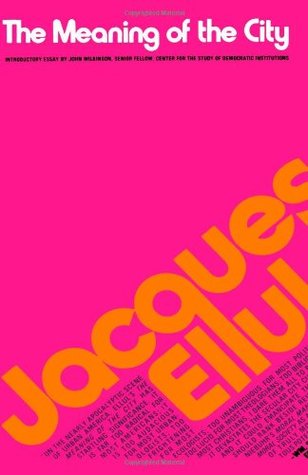- Biblia
- Leer la Biblia
- Versiones de la Biblia
- Verso del dia
- Planes de lectura
- Versos por tema
- Books of the Bible
- Imágenes De La Biblia
- Estudio
- Comentarios
- Concordancias
- Diccionarios bíblicos
- Enciclopedias bíblicas
- Sermones
- Bible Atlas & Maps
- BP Wiki
- Devocionales
- Devocionales de hoy
- Light of the World
- Todos los devocionales
- Inspirational Quotes
- Más
- Picture Quotes
- Videos
- Inspirador
- Estudio Bíblico
- Lo que dice la Biblia
- Bible Q&As
- Daily Bread
- Bible by Genre
- Bible Stories
- Random Bible Verse
- Comunidad
- Store
The Meaning of the City
by Jacques Ellul
Jacques Ellul, a member of the Law Faculty at the University of Bordeaux, is increasingly being recognized as a brilliant and penetrating commentator on the relationship between theology and sociology. In The Meaning of the CityThe Meaning of the City he presents what he finds in the Bible – a sophisticated, coherent theology of the city fully applicable to today's urbanized society.
Ellul believes that the city symbolizes the supreme work of man – and, as such, represents man's ultimate rejection of God. Therefore it is the city, where lies man's rebellious heart, that must be reformed. The author stresses the fact that the Bible does not find man's fulfillment in a return to an idyllic Eden, but points rather to a life of communion with the Savior in the city transfigured.
The Meaning of the City,The Meaning of the City, says John Wilkinson in his introductory essay to the book, is the "theological counterpoint" to Ellul's Technological Society,Technological Society, a work that analyzed the phenomenon of the autonomous and totally manipulative post-industrial world. Ellul takes issue with those who idealistically plan new urban environments for man, as though man alone can negate the inherent diabolism of the city. For Ellul, the history of the city from the times of Cain and Nimrod through to Babylon and Jerusalem reveals a tendency to destroy the human being for the sake of human works. Nevertheless, continuing the theme of the tension between two realities that characterizes all his works, Ellul sees God as electing the city as itself an instrument of grace for the believer.
Ellul believes that the city symbolizes the supreme work of man – and, as such, represents man's ultimate rejection of God. Therefore it is the city, where lies man's rebellious heart, that must be reformed. The author stresses the fact that the Bible does not find man's fulfillment in a return to an idyllic Eden, but points rather to a life of communion with the Savior in the city transfigured.
The Meaning of the City,The Meaning of the City, says John Wilkinson in his introductory essay to the book, is the "theological counterpoint" to Ellul's Technological Society,Technological Society, a work that analyzed the phenomenon of the autonomous and totally manipulative post-industrial world. Ellul takes issue with those who idealistically plan new urban environments for man, as though man alone can negate the inherent diabolism of the city. For Ellul, the history of the city from the times of Cain and Nimrod through to Babylon and Jerusalem reveals a tendency to destroy the human being for the sake of human works. Nevertheless, continuing the theme of the tension between two realities that characterizes all his works, Ellul sees God as electing the city as itself an instrument of grace for the believer.
BUY NOW
Paperback, 232 pages
Published December 19th 1993 by William B. Eerdmans Publishing Company (first published January 16th 1970)
tags: theology, christian, politics, philosophy, christianity, sociology, religion, cities, geography, nonfiction, cultural
Book Quotes
Suscribir
© 2025 Bibleportal.com Reservados todos los derechos.

Jacques Ellul was a French philosopher, law professor, sociologist, lay theologian, and Christian anarchist. He wrote several books about the "technological society" and the intersection between Christianity and politics, such as Anarchy and Christianity (1991)--arguing that anarchism and Christianity are socially following the same goal.
A philosopher who approached technology from a deterministic viewpoint, Ellul, professor at the University of Bordeaux, authored 58 books and more than a thousand articles over his lifetime, the dominant theme of which has been the threat to human freedom and Christian faith created by modern technology. His constant concern has been the emergence of a "technological tyranny" over humanity. As a philosopher and lay theologian, he further explored the religiosity of the technological society.
... Show more